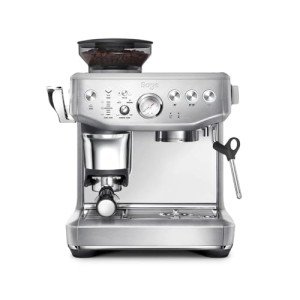A High-Quality Espresso Machines Success Story You'll Never Be Able To

The World of High-Quality Espresso Machines: A Comprehensive Guide
Espresso has become a precious drink amongst coffee lovers worldwide, understood for its rich flavor, extreme aroma, and flexibility. The heart of a great espresso lies in the machine used to brew it. High-quality espresso machines are created to provide the best shot, making them a vital financial investment for coffee enthusiasts. This article checks out different kinds of high-quality espresso machines, their features, maintenance ideas, and responses to frequently asked questions.
Types of High-Quality Espresso Machines
High-quality espresso machines fall into a number of classifications, catering to different choices, skill levels, and budget plans. The primary types include:
| Type of Machine | Description | Ideal User |
|---|---|---|
| Manual Espresso Machines | Requires user ability to control extraction and pressure. Uses the most control over the developing procedure. | Experienced baristas and lovers |
| Semi-Automatic Machines | Combines manual operation with automation. relevant site manage the grind and tamping, while the machine deals with water dispersion. | Intermediate users |
| Automatic Espresso Machines | Automate the developing procedure, allowing for programmable brewing times and temperature levels. | Casual coffee drinkers |
| Super-Automatic Machines | Have integrated grinders and are completely automated, dealing with whatever from grinding to developing and steaming. | Users seeking benefit |
| Commercial Espresso Machines | Designed for high volume use in cafes and restaurants, using durability and speed. | Company owner |
Detailed Overview of Each Type
Manual Espresso Machines
- Pros: Complete control over the brewing procedure; can produce extraordinary quality espresso.
- Cons: Requires significant ability; lengthy.
Semi-Automatic Machines
- Pros: Balanced control, blending manual and automatic processes; exceptional quality espresso is still attainable.
- Cons: Requires some knowledge and experience to master.
Automatic Espresso Machines
- Pros: User-friendly; lowers the learning curve while still producing high-quality espresso.
- Cons: Still requires some understanding of coffee-making basics.
Super-Automatic Machines
- Pros: Maximal benefit; little ability required; suitable for people or households who desire coffee without hassle.
- Cons: Higher rate point; may do not have the fine-tuning capabilities of manual machines.
Commercial Espresso Machines
- Pros: Built for durability and performance; frequently includes features for high-volume turns.
- Cons: Expensive; might be overkill for home use.
Secret Features to Consider
When searching for a high-quality espresso machine, several key functions ought to be taken into account:
- Pressure and Pump Type: Look for machines with a minimum of 9 bars of pressure, which is important for extracting the best flavor from coffee beans.
- Boiler Type: Single, double, and heat exchanger boilers each impact how the machine performs and the speed of brewing.
- Develop Quality: High-quality products such as stainless-steel are more suitable for sturdiness and aesthetics.
- Alleviate of Use and Cleaning: Some machines need comprehensive cleansing, while others are developed for simple maintenance.
- Temperature level Control: Consistent temperature level is vital; consider machines with PID controllers for precise control.
Advantages of High-Quality Espresso Machines
Buying a high-quality espresso machine uses a plethora of benefits:
- Superior Quality: High-end machines allow for greater control, resulting in tastier espresso.
- Sturdiness: Built to last, quality machines require fewer repairs and replacements.
- Customization: Users can enjoy a tailored experience by changing grind size, shot timing, and other settings.
- Increased Convenience: Automatic and super-automatic choices enable connoisseurs to delight in espresso with minimal effort.
Upkeep and Care for High-Quality Espresso Machines
To keep an espresso machine functioning optimally, routine upkeep is vital. Here are pointers for keeping a high-quality espresso machine:
Descale Regularly:
- Use a descaling solution every few months to avoid accumulation of minerals from water, which can impact flavor and performance.
Clean the Brew Group:
- For machines with a detachable brew group, clean it routinely to ensure a clean extraction.
Change Water Filters:
- Use a water filter and change it as needed to lessen pollutants in your brewing water.
Daily Cleanings:
- Rinse the portafilter and group head after each use to prevent oil buildup.
Watch on the Parts:
- Monitor seals, gaskets, and other parts for wear and tear and replace them as needed.
Regularly Asked Questions (FAQs)
1. What is the best espresso machine for newbies?
For newbies, a semi-automatic machine frequently provides a great balance of use and control, permitting users to discover the skills required for making fantastic espresso.
2. Are super-automatic machines worth the investment?
Yes, for those who prioritize benefit and ease over control, super-automatic machines can be a worthy financial investment, specifically for households or hectic professionals.
3. Just how much should I anticipate to invest on a high-quality espresso machine?
High-quality espresso machines range substantially in rate, with manual machines starting at a couple of hundred dollars, while super-automatic or commercial machines can go beyond numerous thousand.
4. Can I make other coffee beverages with an espresso machine?
Yes, lots of espresso machines have steam wands or accessories that allow users to develop lattes, coffees, and more.
5. How long do espresso machines normally last?
With appropriate upkeep, high-quality espresso machines can last over a years, making them a long-lasting investment in your coffee enjoyment.
High-quality espresso machines yield a transformative coffee experience, whether delighted in in the house or in a commercial setting. By understanding the types available, their features, and the maintenance needed to keep them running effectively, customers can make informed choices that elevate their coffee-drinking experience.

